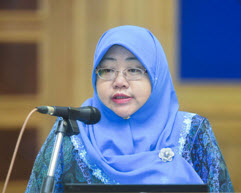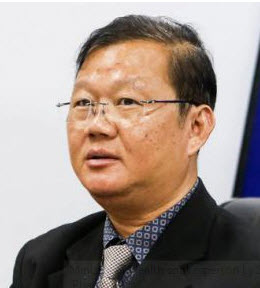ASEAN+3 Field Epidemiology Training Network (ASEAN+3 FETN)
Guided by the Joint Statement of the 4th ASEAN Plus Three Health Ministers Meeting on 23 July 2010 in Singapore, where the Health Ministers of ASEAN Plus Three Countries have agreed upon the common aim in improving health situation in the region, and supported the development of networking among Field Epidemiology Training Programs in ASEAN Member States (AMS) and Plus Three Countries.
The ASEAN Plus Three Field Epidemiology Training Network (ASEAN+3 FETN) was established in 2011 as one component of the ASEAN Expert Group on Communicable Diseases (AEGCD). The Network was set up to act as a catalyst to promote regional collaboration in the field epidemiology training.
The ASEAN+3 FETN comprised of focal points among AMS and Plus Three Countries, with ASEAN+3 Steering Committee as the governing body to oversee the ASEAN+3 FETN work plan implementation. Annual steering committee meeting that consists of country coordinators from each of the ASEAN Member States and Plus Three Countries.
The ASEAN+3 FETN guided by the ASEAN Post-2015 Health Development Agenda (2016-2020) and its Governance and Implementation Mechanism. It will operate through the overarching and strategic direction from the ASEAN Senior Officials Meeting on Health Development (ASEAN SOMHD) through the ASEAN Health Cluster 2: Responding to All Hazards and Emerging Threats.
Guiding Principle
- Equal partnership especially in joint decision making;
- Building the capacity and narrowing the gaps;
- Enhancing trust and cooperation;
- Recognizing and learning from different FET programs in ASEAN+3; and
- Synergizing with global and regional organizations and its strategies including International Health Regulation 2005 (IHR), Asia Pacific Strategies on Emerging Diseases (APSED), and ASEAN Post-2015 Health Development Agenda (2016-2020).
Objectives
- To be the main platform among the ASEAN+3 Countries for capacity building of field epidemiology, regional multi-country and multi-sectoral collaboration in field epidemiology training, sharing experiences and best practices on epidemiology, including collaboration with animal health sectors where appropriate;
- To promote and facilitate collaboration and cooperation among members of ASEAN+3 FETN for the advancement of the training capacity in the region; and
- To advocate and support the development and enhancement of national capacity in field epidemiology training among ASEAN Member States and Plus Three Countries.
Vision
Field epidemiology training established in all ASEAN Plus Three Countries with adequate support, capable human resources and productive work that help prevent and control outbreaks, emerging diseases and other public health events in the country and the region.
Strategies
- Promote capacity building of field epidemiology training in ASEAN+3 Countries
- Enhancing joint effort to prevent and control public health events through collaboration in surveillance, investigation, study, research, etc.
- Ensure active and effective network management for sustainable development.
Guiding Principles
- Equal partnership, especially in joint decision making
- Building the capacity and narrowing the gaps
- Enhancing trust and cooperation
- Harmonizing among different Field Epidemiology Training Programs in ASEAN+3 Countries
- Synergizing with global/regional organizations and its strategies, including IHR 2005, ASEAN Expert Group on Communicable Diseases (APSED), and ASEAN Strategic Framework on Health Development (2010-2015)
ASEAN+3 FETN is under the umbrella of ASEAN Secretariat and an extension of the ASEAN Experts Group on Communicable Diseases Plus Three's (AEGCD+3) Medium Term Plan. In July 2011, ASEAN+3 FETN received endorsement from the ASEAN+3 Senior Officials Meeting on Health Development. ASEAN+3 FETN meets the following health elements under the ASEAN Socio-Cultural Community (ASCC) Blueprint: establish/strengthen/maintain regional support system and network to narrow the gap among ASEAN Member States in addressing emerging infectious diseases and other communicable diseases; promote the sharing of best practices in improving the access to primary health care by people at risk/vulnerable groups, with special attention to HIV and AIDS, malaria, dengue fever, tuberculosis, and EIDs through regional workshops, seminars, and exchange visits among the ASEAN Member States; strengthen regional clinical expertise through professional organizations networks, regional research institution, exchange of expertise and information sharing; and strengthen cooperation through sharing of information and experiences to prevent and control infectious diseases related to global warming, climate change, natural and man-made disasters.
ASEAN Plus Three Field Epidemiology Training Network (ASEAN+3 FETN) Members include Program Directors and the Authorities of field epidemiology training programs in ASEAN Member States and Plus Three Countries: Brunei Darussalam, Cambodia, China, Indonesia, Japan, Lao PDR, Malaysia, Myanmar, Republic of Korea, Singapore, Thailand, The Philippines and Vietnam. Dialogue partners include organizations and networks such as the World Health Organization, Rockefeller Foundation, and Nuclear Threat Initiative.

Designated Focal Points for ASEAN+3 FETN
BRUNEI DARUSSALAM
 | Dr. Hjh Anie Haryani Binti Hj Abd Rahman Director of Environmental Health Services Department of Environmental Health Services. Ministry of Health |
 | Dr. Justin Wong Head of Disease Control Division Department of Environmental Health Services. Ministry of Health |
CAMBODIA
 | Dr. Sovann Ly Director of Communicable Disease Control Dept. Ministry Of Health |
 | Dr. Yi Seng Doeurn Deputy Director of Communicable Disease Control Dept. Ministry Of Health |
In a region prone to emerging infectious diseases and other public health events, ASEAN Plus Three Countries mobilize epidemiologists and other health professionals to detect, assess, prevent and control outbreaks of public health concern. The increase in population, globalization and the recent outbreaks of severe acute respiratory syndrome (SARS), avian influenza (H5N1) and influeza A (H1N1) illustrate the crucial role of epidemiology and the need for communication within the region. Each nation needs sufficient capacity to ensure a prompt public health response in order to protect the public and reduce socio-economic loss.
Effective human resource capacity development is found through Field Epidemiology Training (FET). Commonly found among the Ministries of ASEAN Plus Three Countries, the two-year FET Program (FETP) provides applied field-based epidemiology training to health professionals. Some countries have implemented similar programs of FET, such as Malaysia's Epidemic Intelligence Program (EIP) and Lao PDR's FET, Laos. Some programs have expanded to include veterinarians, a program known as FETP-V, and include health professionals from other countries, known as International FETP (IFETP). These programs strengthen existing public health systems and infrastructures.
Since the 1980s, there have been FETPs in Indonesia, Thailand and The Philippines. In 2002, Malaysia established the EIP. Lao PDR launched FET, Laos in 2009. In the past decade, Cambodia, China, Japan, the Republic of Korea, Singapore and Vietnam have developed an FETP. Although Brunei Darussalam and Myanmar do not have conventional programs, national units are responsible for providing short training courses to health officers.
At the 4rth ASEAN Plus Three Health Ministers Meeting in July 2010, the 13 Health Ministers expressed their support to further the development of networking among field epidemiology training programs among the ASEAN Plus Three Countries to heighten vigilance, preparedness, capacity, communication and collaboration. At the ASEAN+3 Expert Group on Communicable Diseases (AEGCD) Meeting in November 2010, Thailand's Ministry of Public Health was endorsed to be the focal point for this important initiative. In January 2011, Program Directors and the Authorities of field epidemiology training programs in ASEAN Member States and Plus Three Countries coalesced in Bangkok to establish the ASEAN Plus Three Field Epidemiology Training Network (ASEAN+3 FETN). In October 2011, the first ASEAN+3 FETN Steering Committee Meeting successfully agreed on a working mechanism, strategies and activities under the four-year workplan (2012-1015). Since this meeting, ASEAN+3 FETN has continued to work harmoniously and agreed activities have commenced.
July 2010: Received approval from Health Ministers of ASEAN Plus Three Countries to initiate ASEAN+3 FETN.
November 2010: ASEAN Expert Group on Communicable Diseases (AEGCD) Meeting agreed to incorporate ASEAN+3 FETN as a component under Medium Term Plan on Emerging Infectious Disease (2011-2015) detailed under the ASEAN Strategic Framework on Health Development (2010-2015).
January 2011: ASEAN+3 FETN was established. The Terms of Reference (ToR) was developed, which includes the guiding principles, objectives, main activities, governing structure, resource mobilization and funding.
July 2011: Senior Officials Meeting on Health Development Plus Three (SOMHD+3) endorsed ASEAN+3 FETN's ToR.
September 2011: ASEAN+3 FETN successfully conducted its first VDO Conference, which involved network members sharing the situation and epidemiologic training strategies with Hand, Foot, and Mouth Disease. Participants included Members from Cambodia, China, Indonesia, Japan, Malaysia, Myanmar, Singapore, Thailand and Vietnam as well as representatives from WHO's SEARO and WPRO. This regional communication strengthened field epidemiology training (FET), the network, and proved that internal communication among the FETs of ASEAN Plus Three Countries is indeed possible.
October 2011: ASEAN+3 FETN conducted the first Steering Committee Meeting (Bangkok & Pattaya) and successfully agreed on a working mechanism, strategic plan and workplan.
October 2011: ASEAN+3 FETN conducted a Severe Flood Teleconference to communicate about the severe flood situation in Cambodia, Thailand, The Philippines and Vietnam, learn from practices and identify the role of FETPs in response to the disaster. Participants included Members from Cambodia, China, Malaysia, Myanmar, Singapore, Thailand, The Philippines and Vietnam as well as representatives from WHO's SEARO and WPRO. This regional communication strengthened FET, the network, and internal communication among the FETs of ASEAN Plus Three Countries.
